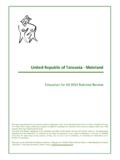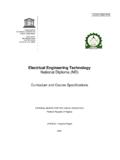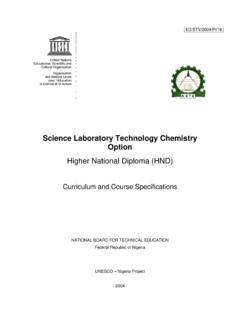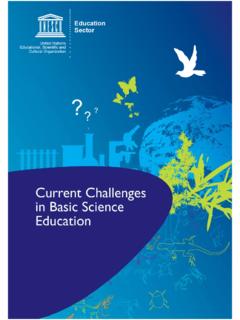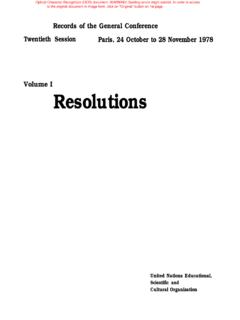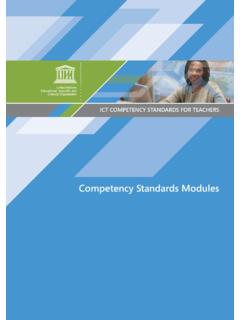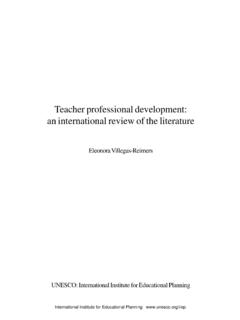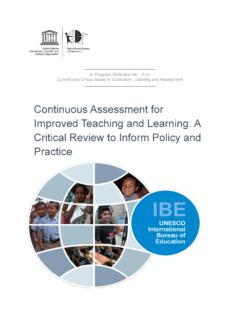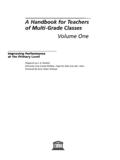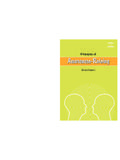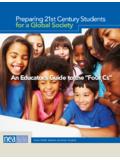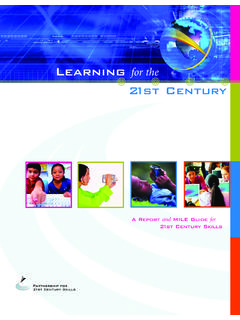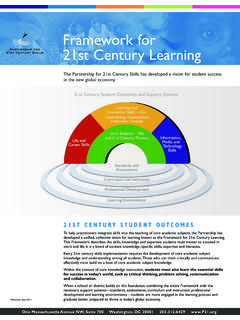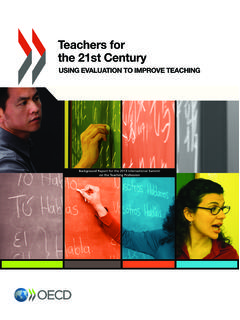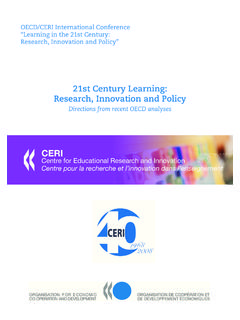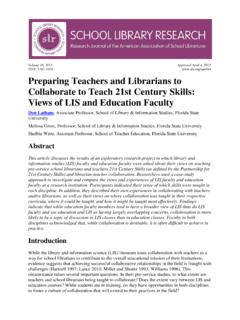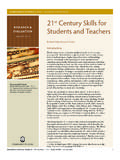Transcription of EDUCATION RESEARCH AND FORESIGHT …
1 EDUCATION RESEARCH AND FORESIGHT15 December 2015 United Nations Cultural OrganizationWORKING PAPERS PREPARING LEARNERS FOR 21st century COMPETENCIES AND SKILLS OVERALL VISION OF TWENTY-FIRST century PEDAGOGY CONCLUSIONS, NEXT STEPS AND FUTURE ISSUESTHE FUTURES OF LEARNING 3: WHAT KIND OF PEDAGOGIES FOR THE 21st century ?Cynthia Luna Scott1 ABSTRACTS ince the emergence of a global movement that calls for a new model of learning for the twenty-first century , it has been argued that formal EDUCATION must be transformed to enable new forms of learning that are needed to tackle complex global challenges.
2 Literature on this topic offers compelling arguments for transforming pedagogy to better support acquisition of twenty-first century skills. However, the question of how best to teach these skills is largely overlooked. Experts recognize that the transmission or lecture model is highly ineffective for teaching twenty-first century competencies and skills, yet widespread use of this model continues. In spite of worldwide agreement that learners need skills such as critical thinking and the ability to communicate effectively, innovate, and solve problems through negotiation and collaboration, pedagogy has seldom adapted to address these challenges.
3 Rethinking pedagogy for the twenty-first century is as crucial as identifying the new competencies that today s learners need to develop. This paper, the third and last in a series on the Futures of Learning, explores pedagogies and learning environments that may contribute to the development and mastery of twenty-first century competencies and skills, and advance the quality of learning. 1 This paper was prepared for UNESCO when the author was a Fulbright Scholar at the National University of RESEARCH AND FORESIGHT WORKING PAPERS2 PREPARING LEARNERS FOR TWENTY-FIRST century COMPETENCIES AND SKILLSR ethinking pedagogy for the twenty-first century is as crucial as identifying the new competencies that today s learners need to develop.
4 Traditional approaches emphasizing memorization or the application of simple procedures will not advance learners critical thinking skills or autonomy. To develop the higher-order skills they now need, individuals must engage in meaningful enquiry-based learning that has genuine value and relevance for them personally and their communities. Real-world experiences merged with sustained engagement and collaboration offer opportunities for learners to construct and organize knowledge; engage in detailed RESEARCH , enquiry, writing and analysis; and communicate effectively to audiences (Barron and Darling-Hammond, 2008).
5 How can teachers and educators best support learners develop essential skills for the twenty first century ? People learn in a variety of ways, so the challenge for teachers is to discover which approaches help them learn most effectively. Until a teacher becomes familiar with a learner s individual strengths and needs, it is difficult to know which learning methods and pedagogy will have a positive impact on that person. Nevertheless, RESEARCH suggests that some forms of pedagogy are consistently more successful than others in helping students acquire a deeper understanding of twenty-first century skills.
6 Pedagogies that support deeper learning include personalized learning strategies, collaborative learning and informal learning (Gijsbers and van Schoonhoven, 2012; Leadbeater, 2008; Learnovation, 2009; Redecker and Punie, 2013).Saavedra and Opfer (2012) argue that learners must hone their skills and enhance their learning as a matter of urgency to be able to address persistent global challenges. However, in spite of worldwide agreement that learners need skills such as critical thinking and the ability to communicate effectively, innovate and solve problems through negotiation and collaboration, pedagogy has not adapted to address these new challenges.
7 The transmission or lecture model still prevails as the dominant instructional approach in EDUCATION throughout much of the world (Saavedra and Opfer, 2012). This approach typically leads to indifference, apathy and for most learners, boredom. Instead, learners need to dedicate time to interacting with mentors and peers and practising and applying newly acquired skills and knowledge. New learning must be assessed and shared with peers through well-designed collaborative encounters that support individuals in adapting their learning to new problems and contexts.
8 Without opportunities to practise and apply new knowledge in a variety of contexts, adaptation and integration of new knowledge will not be achieved. In other words, unless learning environments offer opportunities to communicate new knowledge and solve complex problems through collaboration, it will stifle creativity (p. 8). All things considered, the transmission model is highly ineffective for teaching twenty-first century it is generally recognized that twenty-first century competencies and skills are complex and often challenging to teach, Saavedra and Opfer (2012) argue that learners do not develop these competencies and skills unless they are explicitly taught.
9 There is widespread agreement that learners should develop these skills through disciplinary study rather than standalone courses. According to the OECD s 2008 Teaching and Learning International Survey (TALIS), teachers in twenty-two out of twenty-three participating countries most of which are Northern or Eastern European favoured constructivist pedagogy. However, this survey also demonstrates that in participating countries, twenty-first century skills are not clearly emphasized even when teachers use active learning strategies, such as debate and structured classroom conversations (OECD, cited in Saavedra and Opfer 2012, p.)
10 7).Leadbeater (2008) argues that the successful reinvention of educational systems worldwide depends on transforming pedagogy and redesigning learning tasks. Promoting learner autonomy and creativity is part of the solution. Technologies can be used to support efforts to transform pedagogy, but it is essential to recognize that twenty-first century learning experiences must incorporate more than just technology. Leadbeater also emphasizes that learning strategies for this century will not be limited to school, but will also encompass learning through peers, inter-generational partnerships and community relationships.
